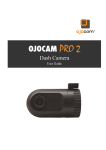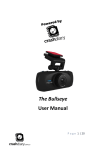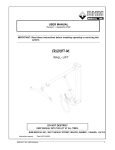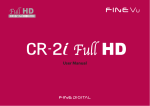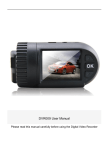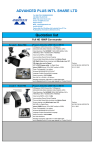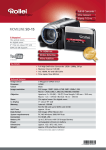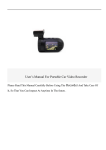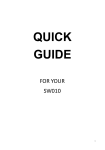Download ojocam Pro user`s manual
Transcript
OJOcam Pro Dashboard Camera User’s Manual Please Carefully Read This Document Prior to First Time Use. Thanks for purchasing OJOCam Pro camera. Any pictures and/or photos in this manual are shown to help users understand the product, but may differ from the actual product (and are subject to change without any prior notice) Any product specification or function in this manual is subject to change for improvement of performance and/or quality Any detail in this manual may be different, depending on software version or business circumstance, and is subject to change without notice Visit the OJOCam website for details: www.ojocam.com You may download the dedicated PC viewer, latest firmware, and User’s Manual from www.ojocam.com. This manual is protected by Copyright, all the rights reserved. Please use you OJOcam product in a safe and proper manner after reading this manual. 2 Contents Preface .............................................................................. 4 Cautions Before Use ................................................................. 4 Operational Condition ............................................................... 4 Product Warranty and Liability ...................................................... 4 1 Product Description ................................................................ 5 1.1 PC System Requirements .......................................................... 5 1.2 Product Appearance and Feature Icons ............................................ 6 2. Basic Configuration (prior to first time use) ..................................... 6 2.1 Inserting a microSD Card ........................................................ 6 2.2 Power On ........................................................................ 7 2.3 Setting Date and Time ........................................................... 7 2.4 Loop Setting .................................................................... 7 3. Advanced Settings: ................................................................ 7 3.1 Video Parameter Settings ........................................................ 7 3.2 Text Overlay: Date and Time, License Plate Number, Off.......................... 8 3.3 Setting Language ................................................................ 8 3.4 GPS: On/Off ..................................................................... 9 3.5 Taking a Picture ................................................................ 9 4. Reviewing Videos and Pictures ..................................................... 9 4.1 Review Video on Camera Screen or TV: ............................................ 9 4.2 Review Pictures ................................................................. 9 4.3 File Protection ................................................................. 9 4.4 Review Video on a TV ........................................................... 10 4.5 Review Video on a PC ........................................................... 10 Appendix ............................................................................ 12 3 Preface Cautions Before Use Do not operate the product while you are operating the vehicle, as it may cause accidents. Please park your car in a safe place before operating the product. Avoid exposing this product to dusty, dirty, or sandy areas to reduce the risk of damaging components. Do not expose the product to high temperature. High temperature may shorten the life span of electronic device, damage the battery, or warp/melt specific plastic parts. Do not set up the product in a cold environment - when the product is heated to its correct temperature, the temperature change will condense moisture inside and damage the circuit. Do not disassemble or modify the product. Doing so may lead to electric shock from the high-pressure internal components. Do not drop or otherwise inflict impact on the product. Impact may damage internal components. Do not clean the product with chemicals, cleaning solution, or high concentration detergent. Clean it gently with a soft, slightly damp cloth. Operational Condition — — — — — — The product should be operated within a temperature range of 0ºC – 40ºC (32℉ - 104℉) Do not operate or expose the product under following conditions: Direct sunlight High temperatures Extremely dusty areas Near air conditioners, heaters, or other extreme temperature sources In a closed car, especially parked in direct sunlight Violent vibration area Product Warranty and Liability Our company shall not be responsible for any problems occurring from use in violation of directions in the User’s Manual. The product is an assistive device for safe driving, and our company shall not be responsible for any damages stemming from product failure and/or data loss. The product uses the recorded and/or stored images upon any shock, incident and/or accident to a vehicle, but does not guarantee that all the images are recorded and/or stored. 4 1 Product Description The OJOcam Pro is equipped with a windshield mount and a built-in GPS receiver for location tracking purposes. Images from the camera are stored on microSD card (optional) for future reference. The camera uses the leading video compression technology (H.264) for the best video quality with minimum storage requirements. OJOcam Pro is very small and can be discretely mounted on windshield. 1.1 PC System Requirements · · · · · Windows 8/7/Vista/XP operating system Intel Core 2 Duo CPU or better Minimum 2GB of RAM (4GB is recommended) Standard USB 2.0 port or better Video card with minimum of 64MB video memory 5 1.2 Product Appearance and Feature Icons 1. Windshield mount w/ GPS receiver; attach 3M sticker here and stick to windshield. If no GPS receiver is included, it is as a bracket only. 2. USB port 3. AV port 4. Up/Menu/Mute 5. OK 6. Down/SOS 7. Light indicator 8. Lens 9. USB (working only when used with GPS receiver) 10. Power on/off/reset (long press to reset) 11. HDMI port 12. microSD card slot (card sold separately) 2. Basic Configuration (prior to first time use) 2.1 Inserting a microSD Card Insert a microSD card (sold separately) into the OJOcam Pro for saving recorded files. Caution: For OC-0801 without internal memory, the recorder does not record video if no microSD 6 card is in place. Samsung Class 6 microSD cards are recommended (please avoid Class 10 card due to incompatibility with the product). 2.2 Power On Press Power button to turn ON/OFF the power, or connect the car charger and the product will turn on when the car starts. 2.3 Setting Date and Time Turn on the camera using the Power button. Press Menu (long press the Up button) then press Up and Down buttons to choose Date and Time. Press OK button to confirm. 2.4 Loop Setting Off, 1 minute, 3 minutes, 5 minutes 1. Off Mode a. The device cannot start recording automatically when the ignition is on. Also, the camera will stop recording when microSD card is full. b. Maximum file size of each recorded video file is 3.66GB. When it reaches the maximum, the recording is automatically split and saved as another file. c. If the microSD card is full, the previous files will not be deleted; when card is full, the display will show "card full" and the camera cannot continue recording. 2. When the Loop Setting mode is "1 min," "3min," or “5min" a. When car ignition is on, the device will record automatically. b. If the microSD card is out of available space, the previous saved file will be automatically overwritten. 3. Advanced Settings: 3.1 Video Parameter Settings Read this chapter to configure the setup and fine-tune the functions. Turn on the camera using the Power button. Press Menu (long press the Up button), then press Up and Down buttons to choose icons. Press the OK button to confirm. 7 1. Video Resolution: 1080P at 30fps, 720P at 30fps 2. Photo size: 4MP, 3MP, 2MP, 0.9MP 3. Flicker: 50Hz, 60Hz (For United States and Canada, please choose 60Hz) 4. AE ISO: AUTO, 100, 200, 400 5. White Balance: Auto (recommended), Sunny, Cloudy, Fluorescent, Incandescent (White Balance is for correction under different lighting conditions. When White Balance is set to Auto, the camera will automatically compensate for different lighting conditions) 6. AE Bias 7. AE Meter Mode 8. TV Type: NTSC, PAL 9. AUTO Power Off 10. Date-Time display: Date-Time, Off, Date, Time 11. Motion Detect: Off, On 12.Power Off Screen: Off, 1 minute, 3 minutes, 5 minutes 13. Video Recorder Mode: Video, Audio/Video 14. G-Sensor Precision: 2.5G, 3G, 3.5G, 4G, 4.5G, 5G, CLOSE 15. Beep Sound Volume: High, Low, Off 16. USB Mode: Mass Storage, USB Camera 17. Choose Card: Built-In Memory, External Card (This function is optional) 18. Language: English, Chinese, Russian 19. Default Setting: No, Yes (This function will restore all settings to factory default) 20. Format: No, Yes (Use this function to format a storage card - note that all the data stored on memory card will be erased, please back up information before proceeding with this operation) 21. Firmware Version: Display firmware version information 3.2 Text Overlay: Date and Time, License Plate Number, Off • In Car Mode, the location coordinates (latitude and longitude) will be displayed on the LCD screen (GPS version only). • After setting up Date, Time, and License Plate Number, if driver number is not shown on the screen, it means the device has insufficient storage space. • Driver Number is 9-character license plate number. 3.3 Setting Language Turn on the camera using the Power button. Press Menu (long press the Up button),then press Up and Down buttons to choose language. Press OK button to confirm. 8 3.4 GPS: On/OFF GPS Tracking (only available with optional GPS Module installed) 1. Plug the GPS Module into the device. Satellite searching will begin automatically. 2. When a GPS signal is located, will be showed on the display. 3. When taking picture in Camera mode, the location will be automatically logged on the microSD card. 3.5 Taking a Picture 1. In Recording mode, long press the OK button to take a picture 2. In Stand-By mode, long press the OK button to take a picture 4. Reviewing Videos and Pictures 4.1 Review Video on Camera Screen or TV • Long press the Down button and select Movie Reviewing to display the latest video files on the LCD screen • Long press the Up button to access video options: Delete File, Protect File, AutoPlay. • Press the OK button to confirm • Long press the Down button twice to return to previous mode 000:00:15 Playback time Play Battery Pause 4.2 Reviewing the Pictures • Long press the Down button to enter Picture Review mode, then long press the Down button again to review the pictures • Long press the Up button to access picture options: Delete File, Protect File, AutoPlay • Press the OK button to confirm • Long press the Down button to return to previous mode 4.3 File Protection 4.3.1 When reviewing the video: 9 1. Long press the Down button and select Movie Reviewing to display the latest video files on the LCD screen 2. Long press the Up button to select the Protect File option, then setup protection for one file or all, etc. - files marked with are protected 3. Press the OK button to confirm 4. Long press the Down button twice return to previous mode Attention: To unlock files, repeat the steps above. After being unlocked, no files will be marked with Under the Loop Record setting, the previous file is not protected. This mode protects only the last cycle-recorded file. 4.3.2 When Recording (SOS) Press the Down button and the current file will be saved, locked, and cannot be deleted. When you copy the video to another storage device, the copied file will be locked. 4.4 Review Video on a TV When connecting to an HDTV, you can display video files or pictures in high resolution. Use the HDMI cable (included) to connect to High Definition TV. Attention: Only playback function works when TV is connected. 4.5 Review Video on a PC Connect the device to a computer with the provided USB cable. This puts the camera into USB mode (effective under Recording Settings: Off). When the camera is connected to the PC, it appears as a removable disk in Windows Explorer. 10 1. 2. 3. 4. 5. 6. 7. 8. Open video file: browse to the microSD card and browse to the video file Delete a file from the playlist Jump to the previous file on the playlist Play video Jump to the next file on the playlist Stop video playback Take a snapshot of the video Volume control (when audio recording is enabled) You can find the video player on the CD, or from the microSD card once it is in use by the camera. Follow the steps below: Connect the machine (without card) with computer There are 2 removable disks (if your machine has a built-in card function, you will see 3 removable disks) Find the flash disk (one of the removable disks, not the card disk), open it, and copy the file to your computer’s hard drive; double-click to unzip the file to a folder Find the GPS Player in the folder, open it, you will get a GPS player with a Google map (like the picture above) After you record the video with GPS attached, connect the camera to the computer, and browse to the microSD card folder → DCIM → 100MEDIA Select the video to playback 11 Appendix Specifications Image Sensor Chip Lens Storage Media ISO Display Still images Videos Audio ½.5" 5MP CMOS Ambarella ,A2S60 1080P@30FPS 135 Wide angle Up to 32GB microSD card (class 6) note: some class 10 microSD cards have potential compatibility issues Auto 1.5″ TFT Format: JPEG (Image Resolution:3MP/5MP) Quality: Auto Compression Format: H.264 (MOV) Resolution: 1920×1080 at 30fps, 1280×720 at 30fps Quality: Auto Built-in Microphone/Speaker Tape Yes White Balance Auto (recommended) Sunny Cloudy Fluorescent Incandescent Exposure Compensation Time and Date Output PC Interface AV Output Format Battery -2.0EV~+2.0EV On/Off, Date and Time Watermarking Function HDMI HD Audio-Video Output USB 2.0 NTSC/PAL Built-in Lithium Ion Battery 12 Troubleshooting Question The device suddenly turned off Captured images are not saved Memory card cannot be used Buttons are not responding Possible Reasons Auto Off Function is On; Low Battery Power is off before the images are saved Memory card is write-protected Solutions Turn on the recorder and check settings; charge the battery Charge the battery Disable write protection on the microSD card Memory card contains Format the memory card; before non-DCF images from formatting, make sure to backup files other cameras Short-circuit when Long press the Power button connecting device with other equipment Light Indicators Charging, Not Recording Standby/Battery Charged Recording, Battery Charged Recording, Charging Battery Solid Red Solid Blue Blinking Blue Blinking Blue/Red Package Contents OJOCam Pro camera Car Power Adapter USB Cable HDMI Cable Spare Double-Sided Sticker Mounting Bracket with GPS Receiver User’s Manual Quantity (Pcs.) 1 1 1 1 1 1 1 NOTE: We reserve the rights to change package contents without notice 13 Glossary of Terms Codec - In communications engineering, a codec is usually a coder/decoder. Codecs are used in integrated circuits or chips that convert e.g. analog video and audio signals into a digital format for transmission. The codec also converts received digital signals back into analog format. A codec uses analog-to-digital conversion and digital-to-analog conversion in the same chip. Codec can also mean compression/decompression, in which case it is generally taken to mean an algorithm or computer program for reducing the size of large files and programs. Frame - A frame is a complete video image. In the 2:1 interlaced scanning format of the RS-170 and CCIR formats, a frame is made up of two separate fields of 262.5 or 312.5 lines, interlaced at 60 or 50 Hz to form a complete frame, which appears at 30 or 25 Hz. In video cameras with a progressive scan, each frame is scanned line-by-line and not interlaced; most are also displayed at 30 and 25 Hz. Frame Rate - The frame rate used to describe the frequency at which a video stream is updated is measured in frames per second (fps). A higher frame rate is advantageous when there is movement in the video stream, as it maintains image quality throughout. Image Compression - Image compression minimizes the file size (in bytes) of an image. Two of the most common compressed image formats are JPEG and GIF. JPEG (Joint Photographic Experts Group) - Together with the GIF file format, JPEG is an image file type commonly used on the web. A JPEG image is a bitmap, and usually has “.jpg” or ".jpeg" as the file suffix. When creating a JPEG image, it is possible to configure the level of compression. As the lowest compression (i.e. the highest quality) results in the largest file, there is a trade-off between image quality and file size. NTSC (National Television System Committee) - NTSC is the television and video standard in the United States. NTSC delivers 525 lines at 60 half-frame per second. PAL (Phase Alternating Line) - PAL is the dominant television standard in Europe. PAL delivers 625 lines at 50 half-frames per second. Pixel (Picture Element) - A pixel is one of the many tiny dots that make up a digital image. The color and intensity of each pixel represents a tiny area of the complete image. USB (Universal Serial Bus) - A plug-and-play interface between a computer and peripheral devices, such as scanners, printers, etc. 14 About the User’s Manual We have tried our best to make sure that what in this User’s Manual is correct and up to date, however, we cannot guarantee that all content without error. If there is a difference between the manual and device, please take the device as standard. We reserve the right to change content or technical regulations without prior notification. In addition, the manufacturer reserves the right to change technical specification without prior notification. If the accessories listed are different from those included with the actual product, please take the actual product as standard. 15 www.ojocam.com Green Collections LLC Address: 1917 Bay Street, Los Angeles, CA 90021, USA Customer Service: 1-855-OJOCAM5 (North America) 1-626-236-2256 (International) 16
















